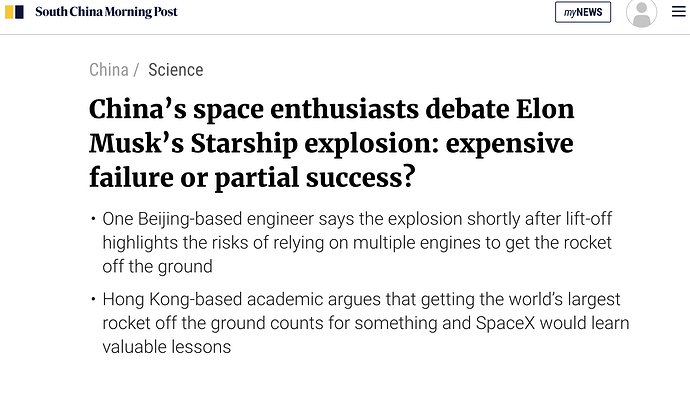-
中国的航天界和公众对 "星舰 "的首次试飞反应不一,该飞船在升空后不久就爆炸了。
-
一些人认为,这次发射为未来提供了宝贵的经验,而其他人则认为这是一次昂贵的失败。
-
天体物理学家昆廷-帕克说,这确实是一个令人敬畏的景象,SpaceX公司表示成功的几率很低,但他们还是发射了它,以收集数据并为未来的发射吸取教训。
-
一位为北京一家航天创业公司工作的火箭工程师说,这是一次技术上的失败,有太多的引擎同时并行工作,大大降低了火箭的可靠性。
-
苏联的N1火箭也有多个引擎,但在1960年代末和1970年代初,所有发射的尝试都失败了。
-
中国长征九号火箭的拟议设计也将使用多个引擎,应注意避免重蹈N1火箭的覆辙。
-
埃隆-马斯克说,SpaceX团队为几个月后的下一次测试发射学到了很多。
-
帕克说,需要接受失败,将其作为能够导致未来更大成功的道路的一部分,因为当我们真的成功了,过去的失败似乎并不重要。
-
China’s space community and public had mixed reactions to the first test flight of Starship, which exploded shortly after lift-off.
-
Some argued that the launch provided valuable lessons for the future, while others dismissed it as an expensive failure.
-
Astrophysicist Quentin Parker said it was a truly awe-inspiring sight, and that SpaceX was indicating the chances of success were low, but they launched it anyway to collect data and learn lessons for future launches.
-
One rocket engineer working for a space start-up in Beijing said it was a technical failure, and that having too many engines working in parallel at the same time dramatically reduced the reliability of the rocket.
-
The Soviet N1 rocket also had multiple engines, but all attempts to launch it failed in the late 1960s and early 1970s.
-
The proposed design for China’s Long March 9 rocket will also use multiple engines and should be careful to avoid repeating the mistakes of the N1 rockets.
-
Elon Musk said the SpaceX team learned a lot for the next test launch in a few months.
-
Parker said that failure needs to be accepted as part of a path that can lead to greater future success, because when we do succeed, past failures do not seem important.
